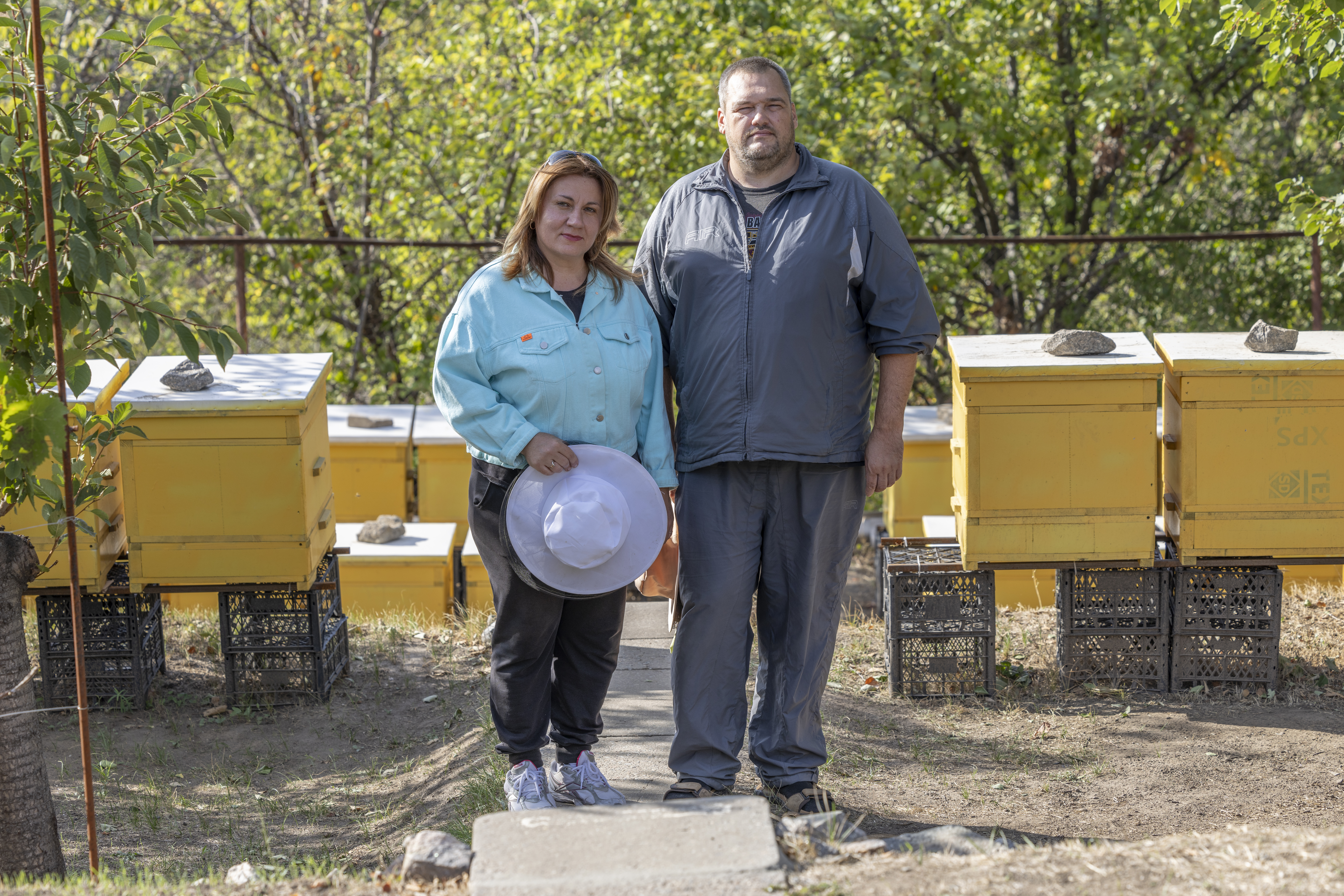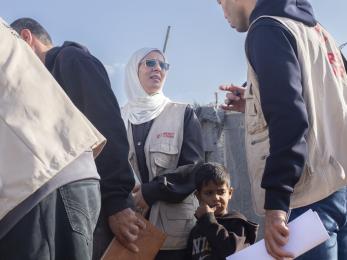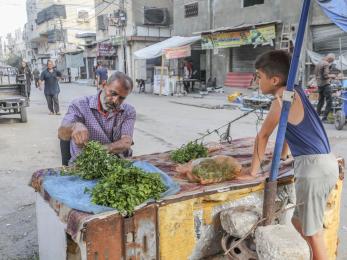Helping Caribbean communities brace for hurricane season
3 ways Mercy Corps is redefining disaster response in the Caribbean
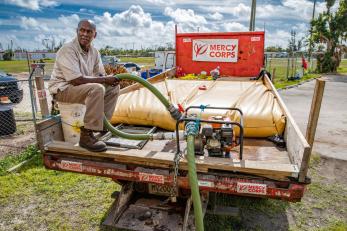
The stakes are high for this year’s hurricane season: more storms, greater intensity, and less time to prepare. According to the National Oceanic and Atmospheric Administration (NOAA), there is a 60% chance of an above-normal Atlantic hurricane season on the horizon. The weather agency is forecasting upwards of 19 named storms this year, with potentially 3 to 5 major hurricanes rated Category 3 and higher. With winds exceeding 110 mph, these major storms are catastrophic for island and coastal communities across the region. And with recent U.S. government funding cuts to the NOAA, communities may have less warning, making early preparation more urgent than ever.
Hurricane season is especially devastating in the Caribbean, where powerful storms can swiftly overwhelm infrastructure, displace communities, and sever access to essential services. Early preparation and long-term resilience are more important than ever. As climate change makes hurricanes more frequent and intense, Mercy Corps is focused on helping Caribbean communities better withstand continued extreme weather.
Delivering emergency support in the wake of disaster
Mercy Corps has been a leading emergency responder to major hurricanes in the Caribbean, helping impacted communities from Haiti to The Bahamas to Puerto Rico survive the immediate aftermath, recover livelihoods and economies, and build back stronger for the future.
In 2021, Mercy Corps developed the Caribbean Resilience Initiative to support islands and territories in the Caribbean region, expanding our programming to Jamaica, Saint Kitts and Nevis, the U.S. Virgin Islands, and Saint Lucia.
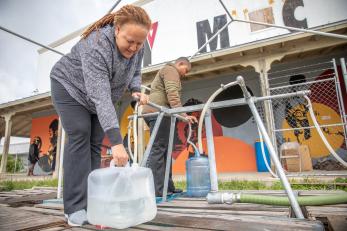
After Hurricane Dorian hit the Bahamas in 2019, Mercy Corps provided clean water to 20,000 people for a year while the local water utility restored services, and following Hurricane Matthew in Haiti in 2016, we reached 30,000 with clean water, hygiene kits, and home repairs—meeting urgent needs long after the storms passed. In the wake of Hurricane Maria in 2017, we partnered with World Central Kitchen to provide more than 25,000 meals in Puerto Rico, distributed supplies and cash assistance to 1,700 families while helping small businesses recover.
Mercy Corps helps communities to prepare now and rebuild stronger
Being prepared for natural disasters like hurricanes or floods can save both lives and money. Every $1 spent on getting communities prepared can save $7 in response and rebuilding. Through our groundbreaking Caribbean Resilience Initiative we bring partners and communities across the region together, implementing new, more effective ways to become better prepared for future disasters before they strike. Mercy Corps is supporting communities across these programs:
Resilience Hubs
In 2017, Mercy Corps established the innovative Resilience Hub model in the aftermath of Hurricane Maria to help communities in Puerto Rico develop infrastructure and support to protect livelihoods and resources during and after extreme weather events. By collaborating with emergency management agencies like FEMA and partnering with community centers that are already a local trusted resource, the buildings now serve as crucial support centers when disasters occur.
During Hurricane Fiona in 2022, local Resilience Hubs in Puerto Rico became their community’s first responders, supplying clean water, meals, and power to families quickly—especially in hard-to-reach communities. Resilience Hubs are equipped with clean water, food, emergency communications technology, solar panels and off-grid power to charge devices and keep medications refrigerated, as well as critical emergency supplies to jumpstart a community's ability to cope and recover.
Today, 20 Resilience Hubs in Puerto Rico are prepared to respond to any disaster and can support over 100,000 people in an emergency. With funding from Takeda, Mercy Corps is working with local partners to turn community centers into Resilience Hubs in Jamaica, St. Lucia, St. Kitts and Nevis, and the U.S. Virgin Islands.
In U.S. Virgin Islands and Puerto Rico, The Home Depot Foundation provided grants to community organizations to stock supplies, purchase equipment, create emergency kits, and strengthen critical infrastructure. By upgrading infrastructure that communities already rely on, the Resilience Hub approach provides a more sustainable path forward.
Disaster preparedness training
By working with local governments and community groups, Mercy Corps supports disaster preparedness initiatives across the Caribbean. Through activities like trainings, developing tools to map hazardous areas and access to resources, and distributing home checklists, families and communities are better equipped to prepare for and cope with extreme weather events. We have also organized community members to support people living with disabilities, or other mobility challenges, and the elderly.
In St. Lucia, we launched a hurricane preparedness campaign and local events bringing together public, private, and non-profit emergency resources at community fairs. Community members can meet with different emergency service providers and learn what resources may be available during a disaster and what steps they can take at home. We’ve collaborated with a local fire brigade in Jamaica to provide water rescue training to people in communities prone to flooding. Across the region we have reached over 700,000 people with a preparedness campaign to raise awareness and connect families to local resources.
Livelihood support
In addition to community preparedness, Mercy Corps focuses on supporting small businesses that play a big role in helping local economies recover in the wake of disaster. We provide access to grants, digital and financial tools, and job skills training for entrepreneurs and businesses. In 2024, we supported communities most impacted by Hurricane Beryl in Jamaica by establishing a fund to help farmers recover from loss of crops and supplies. Across the Caribbean, we have reached over 12,000 small business owners and their employees through grants and business development.
What you can do this hurricane season
Preparing for emergencies can feel overwhelming, but it’s one of the best ways to protect yourself and your family. Knowing the risks in your area helps you to plan ahead and stay ready with the right supplies.
At this early stage of hurricane season, direct support from donors not only helps our teams respond immediately when disaster strikes, it’s critical to help communities prepare in advance of emergencies and lays the groundwork for long-term recovery.
